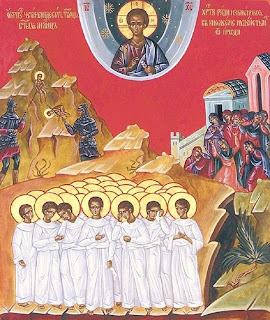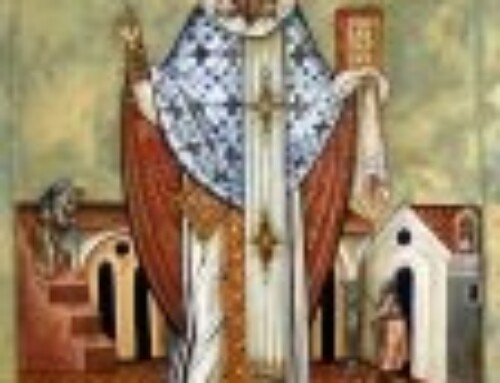December 29th Before the first Christian martyr (the blessed St. Stephen) was killed for embracing the Holy Gospel of the Son of Man, more than 14,000 infants would pay with their lives because of the insane rage vented on them by a jealous king.
The murder of these innocents, which took place soon after the birth of the Holy Redeemer in Bethlehem, remains one of the most hideous crimes in the history of Christianity. It happened after King Herod – the Jewish ruler of Palestine under the authority of the Roman Empire – resorted to the wholesale slaughter of babies in order to destroy the life of the One whom the prophets had said would someday emerge as “the King of the Jews.”The deaths of the 14,000 infants occurred after a group of wise kings from foreign lands (the “Magi”) noticed a new star in the heavens. When they consulted their soothsayers about this strange apparition, they were told that it signaled the imminent arrival of the Jewish Savior who would change the world . . . and that the mysterious new star would lead them to His birthplace. TAKEN FROM The Magi set out to seek the Blessed Infant immediately, and they followed the star for months in order to reach Bethlehem, which would become the birthplace of the Lord Jesus. But when the proud and vainglorious King Herod learned of their mission, he was full of anxiety. How could he prevent this new king from rising up to dethrone him on some future day? Hoping to identify the infant and secretly kill him, Herod urged the Magi to inform of the Babe’s whereabouts, as soon as they had managed to locate Him.The Wise Ones agreed to this plan – after Herod assured them that he, too, wanted only to worship the Infant – but then an Angel of the Lord arrived to tell them that they should not disclose the location of the newborn. After visiting the Blessed Theotokos and her Babe in Bethlehem, the Magi took a different route home . . . leaving the increasingly uneasy Herod to assume that they had not been able to find the future King of the Jews.When the brutal king discovered that he had been fooled, he exploded in rage – and quickly ordered that any male child under the age of two in Bethlehem and its environs should immediately be killed. Hoping that the Holy Infant would be swept up in his dragnet and swiftly disposed of, Herod looked on impassively while thousands of infants were ruthlessly torn from their mothers’ arms and murdered on the spot.
The carnage was devastating, and many of those who witnessed it were driven to the edge of madness by its sheer brutality. While some of the helpless infants were hacked to death with swords, others were hurled against walls and stones. Some were trampled, some were speared, and some were cut in half. Unable to save their children, the mothers screamed and tore their hair. And thus was the ancient Prophecy of Jeremiah fulfilled – the prediction that one day in Rama (located near Bethlehem) there would be heard the sounds of “lamentation and weeping.”
The events that took place during these terrible days are difficult to imagine. Writing about them later, the great St. John Chrysostom described a scene of unimaginable anguish:“The mothers pleaded with the murderers, ‘Why do you butcher our children? What offenses have they committed against you or your king?’ But the soldiers were too busy with their grisly work to reply. Nothing could calm the women, who were in a frenzy and cried out with ever-increasing desperation, ‘Mercy! Mercy! Have you no mothers? Do you not have wives? Are you not put to shame by our naked breasts? What if these were your children? Have compassion on us; slay us rather than our little babies. We cannot bear to see them destroyed! Take our lives first! Wet your swords with our blood! If these children have committed some wrong, put us to death with them.’“
The frantic women were beyond all embarrassment and tore their clothing to shreds, beat their breasts with stones and their fists, clawed their faces, ripped out their hair and shouted to heaven, ‘O Lord and Master, what have our babes done to merit such cruelty? Thou didst create, and the King destroyeth the work of Thy hands; Thou didst grant us children, and he taketh them away. What advantage did we gain in giving birth to sons, if they were destined for nothing more than slaughter?’”
The Venerable Saint John of Damascus also wrote about the agonizing lamentation of the mothers, as follows: “With heads uncovered and hands uplifted to God, the mothers sat beside their murdered sons, experiencing anew the pangs of childbirth. Tearing out their hair, throwing dust upon themselves, and weeping bitterly, they begged heaven to serve as witness to the injustice. They reproached Herod as if he were present: ‘For what reason have you issued such a command, O King? You are a father; you know what love parents have for their children. Was it the star that angered you? Then you would have done better to loose arrows into the sky and to have let milk continue to flow from our breasts. Did the wise men scorn you? If so, you should have launched an attack on Persia and allowed Bethlehem to keep her sons.’”
Finally, it was over.
More than 14,000 of the innocents had died; in later years, many of them would be buried deep in the Grotto of the Church of the Nativity in Bethlehem, directly beneath the stable where the Lord Himself had been born. Here the Patriarch of Jerusalem each December 29th commemorates their tragic deaths in special ceremonies attended by Christians of all denominations.
And what of King Herod?
In the end, his own death would be far more terrible than the deaths of any of his victims. After murdering the Chief-Priests and Scribes among his own people – along with his brother, his sister, and his wife Mariam, the insanely homicidal monarch would develop a wasting disease (dropsy) in which his skin sloughed off and worms slowly devoured his rotting, stinking flesh.
For all its horror, the slaughter of the 14,000 infants at Bethlehem teaches us a valuable lesson about the high price that was paid for the Holy Gospel. This heinous crime against humanity was terrible for those who endured it, and the mothers who suffered are remembered with loving kindness to this day. But in recalling the tragic fate of the 14,000, we are also reminded that the highest price of all was paid by
Our Holy Redeemer Jesus Christ, who took on the sins of the entire world and paid for them with his own agony and death on the Cross.Out of anguish and suffering, the Son of God rose again to glory – having defeated sin and death . . . forever!
Apolytikion in the First Tone Be Thou entreated for the sake of the sufferings of Thy Saints which they endured for Thee, O Lord, and do Thou heal all our pains, we pray, O Friend of man.
Kontakion in the Sixth Tone When the King was born in Bethlehem, the Magi arrived from the East with gifts guided by a Star on high, but Herod was troubled and mowed down the children like wheat; for he lamented that his power would soon be destroyed.


